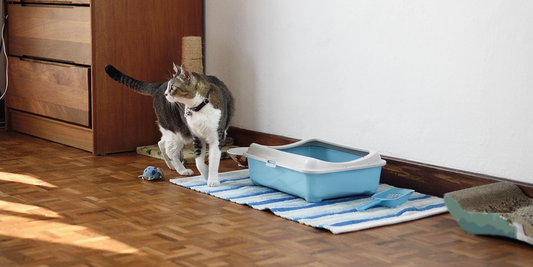Introduction:
Cats are meticulous creatures, and changes in their litter box habits can signal underlying issues. Understanding how to assist your cat when nothing happens in the litter box is crucial for maintaining their health and happiness. In this comprehensive guide, we'll explore seven effective ways to address this issue and ensure your furry companion's comfort.
1. Understanding Your Cat's Behavior
Your cat's behavior offers valuable clues about their well-being. By observing their actions, you can identify potential problems and provide timely assistance.
Cats are known for their fastidious grooming habits. However, excessive grooming could indicate discomfort or anxiety, prompting a need for intervention.
2. Ensuring a Clean Environment
Maintaining a clean litter box is essential for encouraging your cat to use it regularly. Cats are naturally clean animals, and they may avoid a dirty litter box, leading to accidents elsewhere in the house.
3. Choosing the Right Litter
The type of litter you use can significantly impact your cat's litter box behavior. Experiment with different textures and materials to find the one that your cat prefers.
4. Addressing Medical Concerns
Medical issues such as urinary tract infections or constipation can cause your cat to avoid the litter box. Consult your veterinarian if you suspect any underlying health issues.
5. Implementing Behavior Modification Techniques
In some cases, behavior modification techniques may be necessary to encourage your cat to use the litter box consistently. Positive reinforcement and environmental enrichment can help modify undesirable behaviors.
6. Exploring Dietary Adjustments
Diet plays a crucial role in your cat's overall health, including their litter box habits. Ensure your cat's diet is rich in fiber and hydration to prevent constipation and other digestive issues.
7. Creating a Calm Environment
Stress and anxiety can contribute to litter box problems in cats. Create a calm and comfortable environment for your cat, with designated resting areas and hiding spots.
FAQs
-
What are common reasons why my cat avoids the litter box? Common reasons include medical issues, stress, dirty litter boxes, and behavioral problems.
-
How can I encourage my cat to use the litter box? Ensure the litter box is clean, offer different types of litter, and provide positive reinforcement when your cat uses it.
-
Should I punish my cat for not using the litter box? No, punishment can worsen the problem and create additional stress for your cat. Instead, focus on identifying and addressing the underlying cause.
-
Can dietary changes help with litter box issues? Yes, ensuring your cat's diet is high in fiber and hydration can promote healthy digestion and regular bowel movements.
-
When should I consult a veterinarian? If your cat consistently avoids the litter box or exhibits signs of distress, consult your veterinarian promptly to rule out any underlying medical conditions.
-
Are there any natural remedies for litter box problems? While some natural remedies may help alleviate stress and promote relaxation, it's essential to consult with your veterinarian before trying any new treatments.
Conclusion
Addressing litter box issues in cats requires patience, observation, and a proactive approach. By understanding your cat's behavior, providing a clean and comfortable environment, and addressing any medical concerns, you can help your feline friend overcome litter box challenges and enjoy a happy, healthy life.








